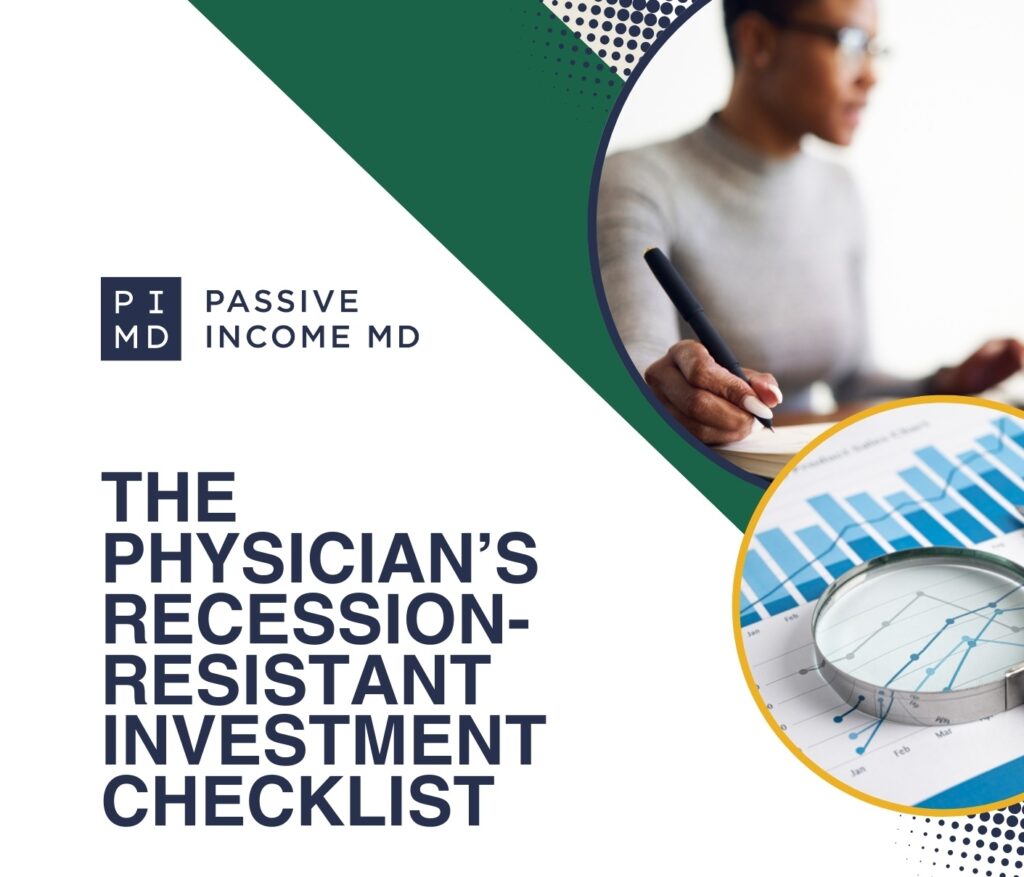Lately, a lot of physicians I know have been asking the same question:
Is the big recession finally coming?
It’s no surprise. For years, financial headlines and market “experts” have been calling for a downturn. I know it’s scared me, don’t know if it’s scared you.
Interest rates have spiked then leveled off. Inflation ran wild, then calmed down. And commercial real estate, especially multifamily, is on wobbly ground.
Tariffs haven’t helped either. Are they good for us or bad? At first, the market dipped, then came roaring back.
Here’s the Dow Jones the last 3 months:
Meanwhile, the broader economy keeps pushing forward. Inflation has been relatively stable, stocks are still relatively strong, and unemployment remains low. For many of us, this feels like the calm before the storm… or maybe the eye of the hurricane.
It’s somewhat like that patient who you know is about to tank. Your antennas are going off even though the vitals look fine from the exterior.
So what should you do if you’re a hardworking physician who’s started building wealth and investing?
Sit and wait?
Definitely not.
Instead, take smart, intentional steps now so you can protect your portfolio, sleep well at night, and set yourself up to thrive, regardless of what the market throws your way.
Let’s break it down: here’s how to recession-proof your investments as a physician.
Why Recession Worries Aren’t Going Anywhere
It’s been over 15 years since the Great Recession. Sure, the COVID crash in 2020 hit fast and hard, but it also bounced back quicker than anyone expected thanks to massive stimulus, near-zero interest rates, and a wave of optimism.
Today looks a lot different.
- Interest rates are the highest we’ve seen in more than a decade
- Commercial real estate is under real pressure
- Investors are cautious—many are sitting on the sidelines
That sense of “something’s coming” makes now the perfect time to check in on your portfolio.
Market Corrections Happen All the Time
I think it’s helpful to zoom out for a second.
The stock market sees a correction (10% drop or more) about once a year. Bear markets (drops of 20% or more) tend to show up every five to six years.
Real estate moves slower, but the impact tends to stick around longer. We’re seeing that now in the multifamily space. With rising interest rates, property values are compressing, and a lot of deals are running into problems when it’s time to refinance.
The good news? Markets always recover. But preparing before the downturn is key.
Step One: Diversify with Intention
As physicians, we’re trained to assess risk and make decisions under pressure… it’s all about the risk-benefit ratio. That skill set is golden when it comes to investing, if we apply it.
The biggest mistake I see from fellow docs is putting too much into one basket. For some, it’s the stock market. For others, it’s a single real estate strategy.
That’s a fragile portfolio. Resilient portfolios are diversified and intentional.
Mix Up Your Asset Classes
Here’s a sample breakdown that’s worked well for many physicians I talk to:
- Stocks and index funds
- Bonds or fixed-income strategies
- Real estate (both active and passive)
- Cash reserves
- Alternative assets like gold or energy investments
Mix Up Your Real Estate Too
If you’re into real estate, don’t just go all-in on one asset type. You can spread across:
- Multifamily
- Short-term rentals
- Self-storage
- Assisted living
- Industrial
Each one behaves differently during market shifts.
Don’t Forget Geography
I used to think I should only invest where I lived because I knew the market. That changed once I saw how powerful it is to diversify across different states and regions. You don’t want your whole portfolio exposed to one city’s economy or zoning rules.
Think Like an All-Weather Investor
You don’t need to predict the future, you just need to be prepared for whatever comes.
Ray Dalio made the “All-Weather Portfolio” concept famous. It’s built on owning uncorrelated assets so you’re not overly exposed to one outcome. You can build your own version of that by balancing:
- Growth investments (like stocks)
- Income generators (like cash-flowing real estate)
- Inflation hedges (like commodities or hard assets)
- Low-correlation options (like private credit or even select alternatives)
This isn’t about playing defense. It’s about playing smart.
Liquidity is freedom. You don’t want to miss the best deals because your money is tied up. The best opportunities often show up during distress.

Want to Stress-Test Your Portfolio?
Download the free Physician’s Recession-Resistant Investment Checklist
To make this super easy, I put together a quick one-page tool: It helps you assess your portfolio’s health and see where you might have blind spots.
What’s Going on With Real Estate Right Now
Let’s be real. A lot of us fell in love with real estate, especially multifamily, as a way to build wealth and gain freedom. It’s been a favorite among physician investors, myself included.
But lately, rising interest rates and tighter lending rules have made things a lot trickier.
Deals that looked solid in 2021 are now facing big challenges – refinancing issues, declining cash flow, and capital calls.
So should you back out of real estate altogether? Not necessarily. But you do need to adjust your approach.
Now’s the time to double down on fundamentals.
And as Warren Buffett says, “Be fearful when others are greedy, and greedy when others are fearful.”
Right now, a lot of people are afraid. That means opportunity for the prepared.
Focus on Cash Flow
Cash flow is everything in this market. Appreciation is nice, but it’s unpredictable. A property that throws off consistent income gives you options and staying power.
Be Conservative in Your Underwriting
Only work with experienced operators who understand today’s environment: higher rates, slower rent growth, and the need for strong reserves.
Keep Some Cash Available
Liquidity is freedom. You don’t want to miss the best deals because your money is tied up. The best opportunities often show up during distress.

Subscribe to receive the 7 Steps you can follow to achieve Financial Freedom
If financial freedom is your goal, there’s no better time to get started than right now.
Unlock actionable steps that you can take every day to fine-tune your goals, discover your interests, and avoid costly mistakes on your financial freedom journey.
Look at Alternatives (But Be Picky)
Alternatives can be a great addition, especially when traditional markets are shaky. Some physician-friendly options:
- Private real estate funds
- Private credit and debt deals
- Oil and gas (plus the tax benefits)
- Gold
- Crypto (yes, even Dalio says it can serve as a hedge now)
Just make sure you’re doing your homework. These aren’t “set it and forget it” decisions. Know the risks and make sure they align with your bigger goals.
Protect Your Sleep
Your portfolio shouldn’t be the reason you’re waking up at 3 a.m.
Keep 6–12 Months of Cash Reserves
That applies to both your household and any businesses you’re involved in. Liquidity gives you breathing room when others are panicking.
Check in on Your Mindset
Are you making decisions based on fear? Or are you grounded in your goals and your “why”? Physicians are good at staying calm in chaos—use that same mindset when managing your finances.
Final Thoughts
Trying to time the market is a losing game. Preparing for volatility is a winning strategy.
You don’t have to completely overhaul your portfolio overnight. But you should take small, intentional steps starting today.
And remember, you’re not alone in this. Rely on our community to help.
You’ve worked hard for your income. Now it’s time to protect it, grow it, and do it in a way that helps you sleep well at night.
Were these helpful in any way? Make sure to sign up for the newsletter and join the Passive Income Docs Facebook Group for more physician-tailored content.
Peter Kim, MD is the founder of Passive Income MD, the creator of Passive Real Estate Academy, and offers weekly education through his Monday podcast, the Passive Income MD Podcast. Join our community at the Passive Income Doc Facebook Group.
Further Reading
